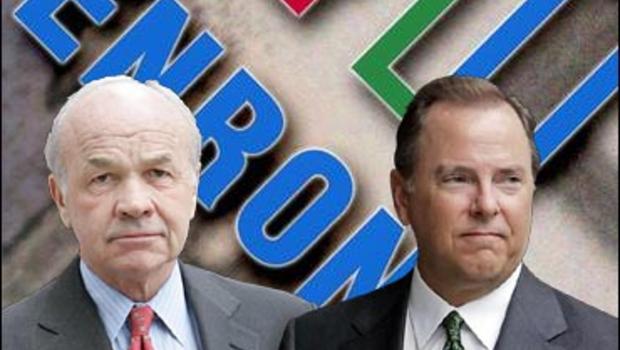 The Chronicle’s Mary Flood leads today with this timely article on the key evidentiary issue in the upcoming criminal trial of top Enron executives, Ken Lay and Jeff Skilling — to what extent the prosecution will be able to get around the hearsay rule by using out-of-court statements made by alleged co-conspirators against Messrs. Lay and Skilling.
The Chronicle’s Mary Flood leads today with this timely article on the key evidentiary issue in the upcoming criminal trial of top Enron executives, Ken Lay and Jeff Skilling — to what extent the prosecution will be able to get around the hearsay rule by using out-of-court statements made by alleged co-conspirators against Messrs. Lay and Skilling.
The issue is important because, according to the Enron Task Force, just about anybody who worked in Enron’s upper management ranks was a co-conspirator.
In an unprecedented move, the Task Force has named over 100 co-conspirators in the case. So, the potential definitely exists for substantial testimony about out-of-court statements going to the jury without the defense ever having an opportunity to cross-examine the persons who made the alleged statements.
Moreover, fingering unindicted co-conspirators is an equally effective technique for the Task Force to prevent testimony that is favorable to the defense because persons named as unindicted co-conspirators are likely to the assert their Fifth Amendment privilege against self-incrimination and thus, not be defense witnesses during the trial.
Thus, the Task Force’s liberal use of the co-conspirator tag has a double-whammy effect — not only does it allow the Task Force to use out-of-court statements against defendants without having the declarant of the statements subjected to cross-examination, it has also effectively prevented previous Enron-related defendants from obtaining crucial exculpatory testimony from alleged co-conspirators who have elected to take the Fifth and declined to testify.
The co-conspirator tactic has had a huge impact on two of the previous Enron-related trials.
During the Nigerian Barge trial, the Task Force used out-of-court statements of co-conspirators regarding the key factual issue in the case — that is, what was said during a conference call between several Merrill and Enron executives, including former Enron CFO Andrew Fastow — without ever having to put a witness on the stand who actually participated in the call.
Similarly, none of the dozens of unindicted co-conspirators testified on behalf of the defendants during that trial, so the Task Force’s use of the tactic effectively prevented the Merrill Lynch executives in that case from providing the jury with exculpatory testimony.
Not surprisingly, the Task Force’s liberal use of the co-conspirator tactic has become a key appellate point for the Merrill executives in the appeal of their convictions.
Similarly, the importance of the co-conspirator issue on freezing out exculpatory testimony was brought into full focus during the trial of the Enron Broadband case last year.
In a trial that, at the outset, appeared to be a sure-thing for the prosecution, the Task Force’s case unraveled quickly as witnesses Lawrence Ciscon and Beth Stier both testified to a riveted jury about how the Task Force’s threats of prosecution against them gave them second thoughts about providing the exculpatory testimony that they gave during the trial.
That trial ended in a disastrous mix of acquittals and jury deadlock on the prosecution’s charges.
Thus, Judge Lake’s handling of the issue could have an equally dramatic effect on the Lay-Skilling trial.
Although reasonable people can disagree about whether the charges against executives such as Lay and Skilling would be better sorted out in a civil case rather than a criminal one, there is no reasonable justification for allowing the government to prejudice Lay and Skilling’s right to a fair trial by manipulating the unindicted co-conspirator tactic to use otherwise inadmissible hearsay testimony and to chill witnesses from providing exculpatory testimony.
That the government feels compelled to use such dubious tactics to obtain convictions of Lay and Skilling is strong evidence that the government’s criminalization of agency costs in the post-Enron era is contrary to justice and the rule of law.
Like this:
Like Loading...
 The Washington Post’s Robert J. Samuelson has seen the problem with the American health care finance system — it’s us:
The Washington Post’s Robert J. Samuelson has seen the problem with the American health care finance system — it’s us:

